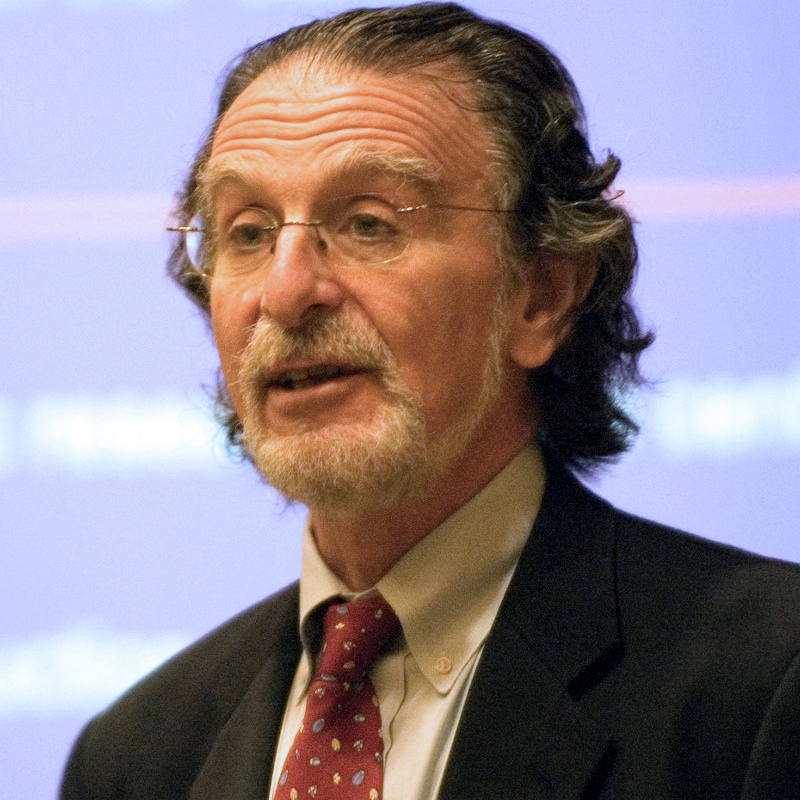
David Klahr
Walter van Dyke Bingham Professor of Cognitive Development and Education Science, Emeritus
Areas of Expertise
Developmental, Learning Science
Bio
David Klahr received his undergraduate degree from MIT in Electrical Engineering (1960), and his Ph.D. in 1968 from Carnegie Mellon's Graduate School of Industrial Administration (“GSIA”, now the Tepper School of Business) in Organizations and Social Behavior. From 1966-69, he was an Assistant Professor at the University of Chicago with joint appointments in the School of Business and the Department of Mathematics. In 1968 – 69, he was a Visiting Research Fellow at the University of Stirling, Scotland, and a Visiting Fulbright lecturer at the London School of Business. He returned to Carnegie Mellon with a joint appointment in GSIA and Psychology in
Throughout his career, Klahr has focused on the analysis of complex cognitive processes in such diverse areas as voting behavior, college admissions, consumer choice, peer review, problem solving and scientific reasoning. He pioneered the application of information processing analysis to questions of cognitive development, and, in collaboration with Iain Wallace, formulated the first computer simulation models to account for children's performance on a variety of Piagetian tasks and other types of problems.
Dr. Klahr's most recent research has investigated the cognitive processes that support children's understanding of the fundamental principles underlying scientific thinking. This work includes both basic research with 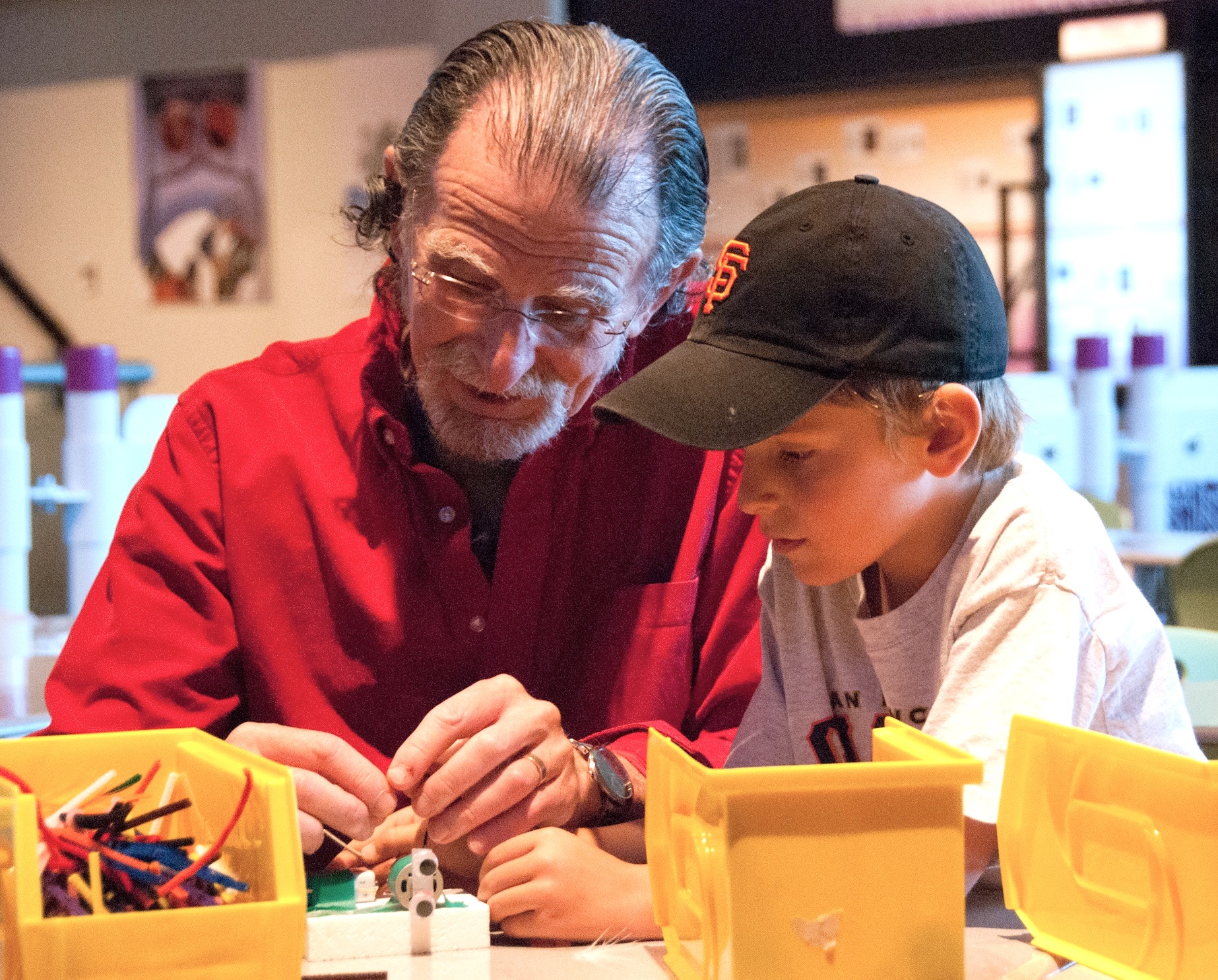 pre-school children and more applied classroom studies
pre-school children and more applied classroom studies
He is a Fellow of the APA, a Charter Fellow of the APS, on the Governing Board of the Cognitive Development Society, a Member of the Society for Research in Child Development, and the Cognitive Science Society. He was an Associate Editor of Developmental Psychology and has served on the editorial boards of several cognitive science journals, as well as on the NSF's subcommittee on Memory and Cognitive Processes, and the NIH's Human Development and Aging Study Section. His research has been supported by grants from the Spencer Foundation, the Social Science Research Council, the Office of Naval Research, the National Science Foundation, NICHD, The McDonnell Foundation, the A. W. Mellon Foundation, the J. M Cattell Fund, and the Institute of Education Sciences.
He has served on three Committees of the National Research Council: the Committee on Foundations of Educational Assessment (Knowing What Students Know, National Academies Press, 2001 ), the Committee on Research in Education (Advancing Scientific Research in Education, National Academies Press, 2004 ) and the Committee on Science Learning (Taking Science to School: Learning and Teaching Science in Grades K-8, National Academies Press, 2007). He also serves as
In 2009, the 37th Carnegie Symposium on Cognition honored Klahr's contributions to the field by organizing a three day symposium in his honor.
Projects
Pittsburgh Science of Learning Center
Program in Interdisciplinary Education Research
Publications
Books
Edited or Authored Books
|
Cognition and Instruction. Hillsdale, NJ: Lawrence Erlbaum Associates. |
Complex information processing: The impact of Herbert A. Simon. Hillsdale, NJ: Lawrence Erlbaum Associates. |
|
An information Processing View. Erlbaum, Hillsdale, NJ. |
|
|
|
Cognition and Instruction: Mahwah, NJ: Erlbaum |
National Research Council Reports published by the National Academies Press
|
Knowing What Students Know: The Science and Design of Educational Assessment Washington, DC.: National Academies Press. |
|
Advancing Scientific Research in Education. Washington, DC.: National Academies Press. |
Taking Science to School: Learning and Teaching Science in Grades K-8 . Washington, DC.: National Academies Press. |
Articles
DEPARTMENT OF EDUCATION RENEWS PIER GRANT FOR $3.6 MILLION. Carnegie Mellon News, Monday September 14, 2015
Psychology Professor David Klahr's Work Integrating Children's Cognitive Development and Education Sciences Celebrated In New Book. Carnegie Mellon News, Monday, April 16, 2012
Moving Forward. Carnegie Mellon Homepage Stories, Health and Wellness, Summer 2011.
Experts review psychology of science teaching. Education Daily, Vol. 44, No. 149 · Tuesday, August 30, 2011
Think Like A Scientist. Science News, Vol 175 #13 (p.20) June 20, 2009
The Science Storm: Some say direct instruction works best, while others argue for the discovery learning method. Surprisingly, the two camps are very close to being on the same team District Administration, March, 2005
A Science Study's Author Responds to Critics. Education Week, January 5, 2005
To Improve Education, We Need Clinical Trials To Show What Works. Wall Street Journal (Eastern Edition). New York, N.Y.:Dec 17, 2004.
The Best Ways to Make Schoolchildren Learn? We Just Don't Know
Sharon Begley. Wall Street Journal (Eastern Edition). New York, N.Y.:Dec 10, 2004. p. B.1
Stand and deliver...or let them discover? District Administration, November 2004
NCLB Could Alter Science Teaching, Education Week, November, 2004
Studying Ways to Improve Education: A two-year program has selected 13 fellows to conduct school-based research with leaders in the field. APA Monitor, September, 2004
Instruction versus exploration in science learning. APA Monitor, June, 2004
Press Releases
DEPARTMENT OF EDUCATION RENEWS PIER GRANT FOR $3.6 MILLION. Carnegie Mellon News, Monday September 14, 2015
U.S. Department of Education Renews Carnegie Mellon Grant To Continue Improving Education Research Carnegie Mellon Press Release, Sept 2009
Psychologist David Klahr named Bingham Professor. The Tartan, October 15, 2007
Carnegie Mellon Names Leading Education Researcher to Bingham Professorship. Carnegie Mellon Media Relations, October 8, 2007
Carnegie Mellon Psychologist Named to National Academy of Education. Carnegie Mellon Media Relations, April 30, 2007
Carnegie Mellon Today: Connecting the University Community; alumni, faculty, staff,students, parents & friends. Cover Story: Transforming America's Schools
Jonathan Potts, Nov. 2005, Vol. 2, No. 3
Carnegie Mellon Receives Multi-Million Dollar Grant To Train the Next Generation of Education Researchers. Carnegie Mellon Media Relations, September, 2004
Carnegie Mellon Cognitive Psychology Research Boosts Middle School Students' Science Comprehension and Test Scores. Carnegie Mellon Media Relations, August, 2004
Klahr speaks at Secretary of Education's Science Summit (March 2004)
Carnegie Mellon Cognitive Psychologist To Speak At U.S. Department of Education Summit. Carnegie Mellon Media Relations. March, 2004
Carnegie Mellon Psychology Department Receives Grant To Study and Improve Middle School Science Instruction. Carnegie Mellon Media Relations, October, 2003
Carnegie Mellon Researchers Say Direct Instruction, Rather Than "Discovery Learning" Is Best Way To Teach Process Skills In Science, at recent meeting of AAAS (February 1998).
Letters to the Editor
How researchers get federal money. Post-Gazette: August 1983
Klahr, D. (2001) Directions to " Eureka!" Science , 292, 2009
Exhibit A. by David Klahr Post-Gazette: September 7, 2004
The rebuttal entitled, Theory, not fact. Post-Gazette: September 11, 2004
Videos of Lectures and Interviews
"Talk at Inaugural Conference of the Society of Research on Educational Effectiveness. Dec. 2006.
"Informal interviews on a variety of topics, recorded at SRCD 2007"
This video contains a presentation that I gave at the Saclker Colloquium on the Science of Science Communication, at the National Academy of Science in May, 2012. The description of the full colloquium can be found at: http://www.cmu.edu/news/stories/archives/2012/june/june5_communicatingscience.html
"Presidential Symposium at Annual Meeting of AERA (April, 2014) * Intro: Barbara Schneider, President of AERA; David Klahr, CMU; Nora Newcomb, Temple; Dan Schwartz, Stanford; Bror Saxberg, Kaplan; My talk (~20 min) is an attempt to indicate the intersection between NSF, IES, and AERA."
Talk on history of Psychology Department (and Herb Simon's role) presented at 100th anniversary of Psychology Department reunion, May 20, 2016. https://youtu.be/ZXVOaFKi1fI
Klahrlab Photos, Past and Present
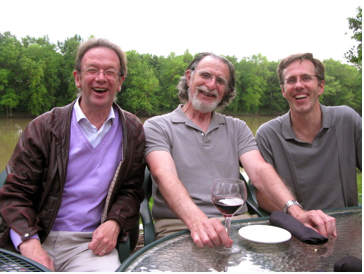
Kevin Dunbar David Klahr Chris Schunn
This photo, of Kevin Dunbar, me, and Chris Schunn was snapped at a dinner during the "Second Purdue Symposium on Psychological Sciences: Psychology of Science: Implicit and Explicit Reasoning", held at Purdue University, in June 2010.
Kevin and Chris both played a crucial role in my work on the psychology of science, summarized in (Klahr, 2000). Kevin worked with me as a post-doc from 1985 to 1988, and Chris was at CMU from 1990 to 1998: first as my grad student, and then as a post-doc with John Anderson. I guess I'm the intellectual grandpa here: after Kevin left my lab at CMU, he joined the faculty at McGill, where he supervised Chris' senior thesis, and then Chris came to CMU to work with me. Kevin is currently at the University of Maryland. Chris Schunn is now at the University of Pittsburgh's Learning Research and Development Center.
The sharp-eyed viewer will notice that I am the only one with a glass of wine before me. However, lest YOU make a faulty inference here, you should be aware that off to Kevin's right and Chris's left, but unseen in this photo, sit glasses recently emptied by each of them, while mine is hardly touched. That is why their smiles are much larger than mine here.
2013 Group Picture: (back row L-R) Cressida Magaro, Stephanie Siler, Kevin Willows (front row L-R) David Klahr, Audrey Russo, and Audrey Kittredge
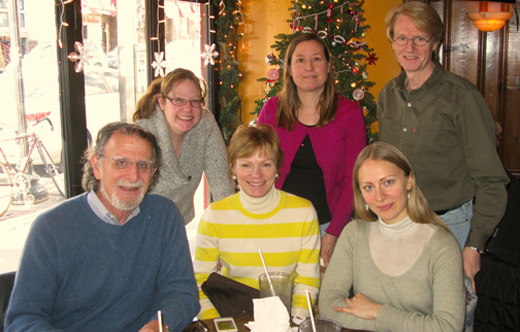
2012 Group Picture: (back row L-R) Kevin Willows, Audrey Kittredge, Audrey Russo, Cressida Magaro and Cathy Chase (front row L-R) Stephanie Siler and David Klahr
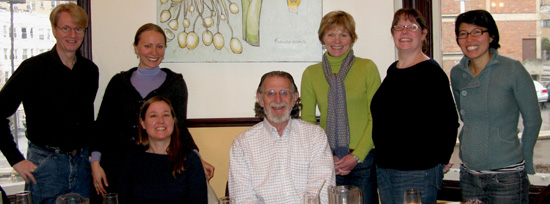
My research group size varies between 3 or 4 and 8 to 10. As of summer 2010 the group included:
(back row L-R) Cressida Magaro, Jordan Lippman, Maria Ptouchkina (summer intern), Audrey Russo, David Klahr, Bryan Matlen, Kevin Willows, Dana Mowery (pboe) (front row L-R) Trisha Fultz (summer intern), Stephanie Siler, Jamie Jirout with baby Riley. The two summer interns are from PSLC. Dana Mowery is a science teacher at the Pittsburgh Public School SciTech Academy.
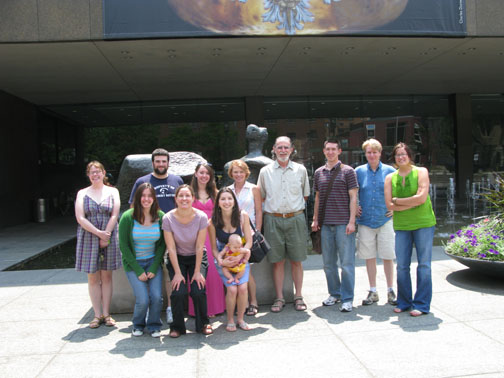
The next photo shows the group (as of Spring 2009), and also includes former post-doc Mari Strand-Cary, with first child, Vaugh Loren.
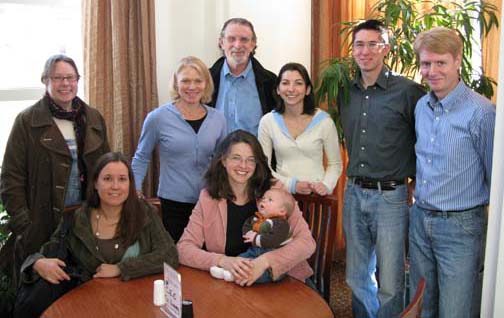
Spring 2009 Group Picture: (back row L-R) Cressida Magaro, Audrey Russo, David Klahr, Jamie Jirout, Bryan Matlen, Kevin Willows (front row L-R) Stephanie Siler, Mari Cary with baby Vaughn Loren Cary.
Next is the group from around 2008:
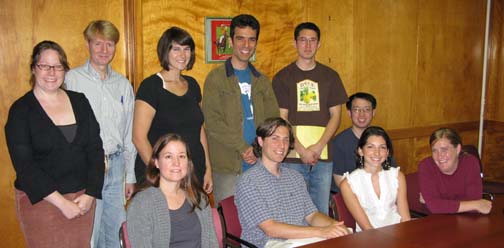
(back row L-R) Cressida Magaro, Kevin Willows, Jodi Davenport, Ido Roll, Bryan Matlen, Ben Shih (front row L-R) Stephanie Siler, Tom Lauwers, Jamie Jirout, Ruth Wylie (not pictured are Mari Carey, Junlei Li, Audrey Russo.)
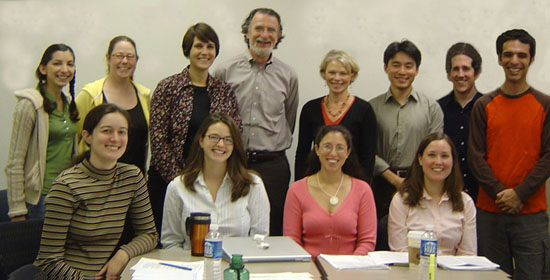
2006 Group Picture: (back row L-R) Jamie Jirout, Cressida Magaro, Jodi Davenport, me, Audrey Russo, Junlei Li, Matt Easterday, Ido Roll (front row L-R) Camellia Sanford, Mari Carey, Elida Laski, Stephanie Siler

Group picture of: Chris Carroll, Norma Cheng, Junlei Li, Elida Laski, Stephanie Siler, me, Audrey Russo, Mandy Jabbour, Mari Strand Cary, (missing from photo is Cammie Williams) going back to 2005.
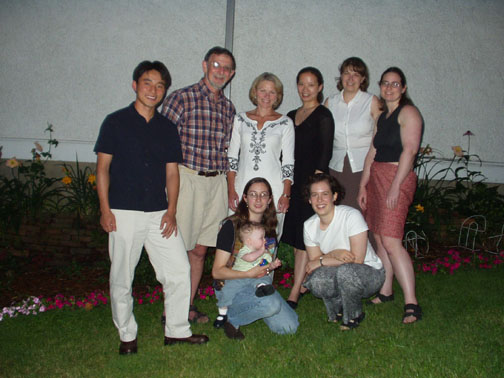
As of summer of 2003-group picture of: Junlei Li, me, Audrey Russo, Norma Chang, Jen Blessing, Laura Triona, Jen Schnakenberg with baby Emily, and Amy Mansnick.
Going back a dozen years or so, the research group consisted of the following:
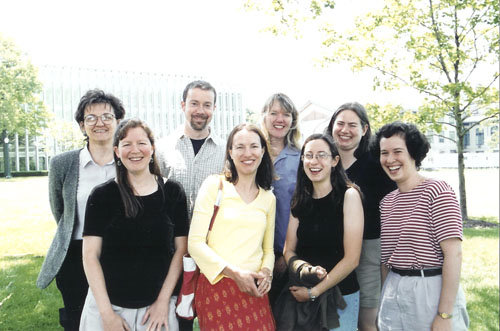
Back row from left to right: Eva Toth, Brad Morris, Virginia Fraser, Lara Triona
Front row from left to right: Anne Seigel, Milena Nigam, Jennifer Schnakenberg, Amy Masnick. I
guess I was the photographer on this one.
And finally, this shot from Halloween 1991, when my group surprised me by all dressing up as me (beard, tie, glasses, etc.). Included here are, from left to right:
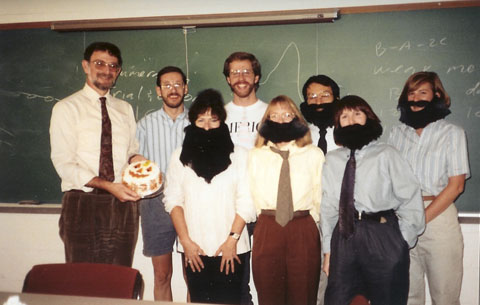
David Klahr, David Penner, Annette Karmiloff-Smith, Chris Schunn, Shari Ellis, Takashi Okada, Anne Fay, Susan Glotfelty. I leave it to the observer to decide which beards are real. Note that Chris Schunn (center rear) also appears in the June 2010 photo.

 Klahr, D (Ed). (1976).
Klahr, D (Ed). (1976). Klahr, D., & Kotovsky, K. (Eds.). (1989).
Klahr, D., & Kotovsky, K. (Eds.). (1989).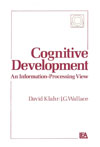 Klahr, D. and Wallace, J.G. (1978)
Klahr, D. and Wallace, J.G. (1978)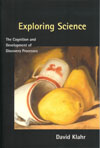 Klahr, D. (2000).
Klahr, D. (2000).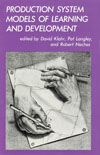 David Klahr , Pat Langley and
David Klahr , Pat Langley and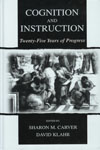 Carver, S. M. and Klahr D. (Eds.) (2001)
Carver, S. M. and Klahr D. (Eds.) (2001)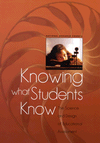 Committee on the Foundations of Assessment: Pellegrino, J. W, Chudowsky, N. & Glaser, R. (Eds.) (2001)
Committee on the Foundations of Assessment: Pellegrino, J. W, Chudowsky, N. & Glaser, R. (Eds.) (2001) Committee on Research in Education : Towne, L., Wise, L. L. & Winters, T. M. (Eds.) (2004)
Committee on Research in Education : Towne, L., Wise, L. L. & Winters, T. M. (Eds.) (2004) Committee on Science Learning, Kindergarten through Eighth Grade: Duschl, R. A., Schweingruber, H. A., & Shouse, A. W. (Eds.) (2007)
Committee on Science Learning, Kindergarten through Eighth Grade: Duschl, R. A., Schweingruber, H. A., & Shouse, A. W. (Eds.) (2007)